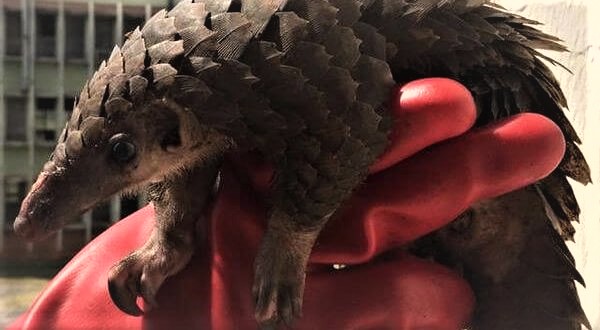IBADAN, OYO: Ivy’s life would have probably ended two years ago. Her scales would have been taken off, disguised as furniture and exported for use in traditional Chinese medicines. But she is alive today after being rescued from her captors and released back to the wild.
Well, the shy, scaly, and active-at-night Ivy is no human but a pangolin rescued on Christmas Day 2020 at a bushmeat market in Ogun State by the Pangolin Conservation Guild Nigeria or PCGN, a non-governmental organisation.
Despite being protected under the Convention on International Trade in Endangered Species of Wild Fauna and Flora, the highest international law on wildlife protection, the pangolin is the world’s most trafficked mammal.
A hot spot for trafficking
Nigeria has become a major hub for the trafficking of pangolin scales. Around 55% of all global pangolin scale exports were linked to Nigeria between 2016 and 2019.
Out of eight species of pangolins, four – black-bellied, white-bellied, giant, and ground pangolins – are found in Africa, including Nigeria.
As Asian species faced extinction, exports of pangolin scales surged in Africa to meet local demand for scales used in traditional Chinese medicines. But scientists say there is no proof that the pangolin or its scales have medicinal value.
Today, all of Africa’s pangolins are classified as endangered or vulnerable by the International Union for Conservation of Nature. This means their populations are being hammered and pushed towards extinction.
Meanwhile, pangolins play an important role in the ecosystem. Estimates from the World Pangolins Day website say one pangolin consumes up to 70 million insects yearly, that is about 191,780 insects per day. They also help improve soil quality and texture for crops and trees when, for shelter, they burrow the soil almost the same way humans turn it in their gardens or fields, thereby exposing it to fresh air.
Saving Nigeria’s pangolins
Olajumoke Morenikeji is a professor of parasitology and founder of the PCGN, the nonprofit that rescued Ivy. Morenikeji started saving pangolins when she was director of the Zoological Garden at the University of Ibadan between 2010 and 2016.
“Every time we got a pangolin, it died after a few days,” she told Prime Progress. “I became very worried because, at that time in the zoo, we had a lot of successes with animals, but the pangolins we got were not surviving. So I took a special interest in it because I wanted to know why.”
Her research led her to discover that Nigerian pangolins are highly trafficked and can hardly survive in captivity outside their natural habitats – tropical forests and grassland. She then founded the guild for protecting the shy creature. Its members now include veterinary doctors, animal biologists, zoologists, and other professionals.
Several times yearly, PCGN engages bushmeat sellers, community leaders, local vigilante groups, and secondary and tertiary institution students through workshops and public lectures (mostly in the six southwest states ); educating them on the plight of the pangolin, the dangers posed by their extinction, and how to conserve them.
It invites law enforcement agents from the Nigeria Police Force, Nigeria Customs Service, Immigration Service, the Nigeria Security and Civil Defence Corps, and the National Environmental Standard and Regulations Enforcement Agency to participate in the workshops.
“Of all the law enforcement agents we invited in 2016, almost none of them had seen a pangolin before, despite that under the Endangered Species (Control of International Trade and Traffic) (Amendment) Act, 2016, there is protection for wildlife animals. So if law enforcement agents do not know anything about pangolins, how will they enforce the law?” Morenikeji explained.
The organisation also set up a community task force in Epe community in Lagos State, a known wildlife market. The task force, comprising about 32 local market leaders and community chiefs and youths, reports cases of pangolin hunting and trafficking to the nonprofit.
It then alerts security personnel to help rescue the captured pangolin, especially when the captor is hostile. Other times, task force members would go to the scene to save a pangolin.
After retrieving a pangolin from traffickers alive, PCGN treats it medically to heal its sustained injuries and stress, and releases it into a protected forest. It has saved about 70 pangolins through this process since 2016, giving some of them human names “to show our fondness for them, and also to keep records, and to remember the peculiarities of each pangolin,” Morenikeji said.
That was how two pangolins it rescued on Christmas Day 2020 came about their names – Ivy and Holly.
Michael Ogunyemi, a hunter in Epe, hunted pangolins in the past. But now, he assists the PCGN in rescuing them from traffickers.
“I didn’t know it was a crime to kill pangolins until these people [PCGN] came to speak to us. Before, whenever I saw one while hunting, I quickly looked for those who bought them between N5,000 and N10,000. [Now] I see it as a responsibility to protect them,” he said.
The organisation inserts a GPS (global positioning system) tracker on each pangolin rescued to monitor its movement. But Morenikeji said not all rescued from poachers and hunters survive under PCGN’s care, especially those badly injured or overstressed by their captors.
The foundation, which depends on voluntary personal financial support from its members for logistics, lacks dedicated rescue vehicles due to a lack of funds. Relying on public transport for rescue missions means a badly-injured or stressed pangolin could die before the team’s arrival due to delay.
“People call us from all over the country; somebody called us from Kogi State one day, and we had to go there. If we have a running vehicle, we will always move more and do more rescues,” the professor said.
“We are looking at wildlife conservation funding agents, individuals and companies to support our efforts to ensure that the environment is conducive for humans to live in. It can only be conducive when we care for everything in the environment.”
And despite the group’s awareness, some hunters have refused to stop hunting the animal.
“I almost got into a fight with a colleague when trying to persuade him not to sell a pangolin. He [asked] ‘why am I fighting for an ordinary animal?'” said Ogunyemi, the hunter turned conservationist. “We have declared that pangolins and elephant tusks should not be sold in the Epe market again, but they do it secretly.”
Meanwhile, Ivy is thriving in her new home – an undisclosed protected forest reserve in Nigeria’s southwest region (undisclosed for safety reasons).
This story was produced with the support of Nigeria Health Watch through the Solutions Journalism Network, a nonprofit organisation dedicated to rigorous and compelling reporting about responses to social problems.
Ivy, a rescued pangolin from a Nigerian bushmeat market, highlights the plight of the world's most trafficked mammal. Despite international protections, Nigeria has become a significant hub for pangolin trafficking, with 55% of global exports linked to the country between 2016 and 2019. Pangolins are vital for ecosystems, consuming large quantities of insects and enhancing soil quality. However, all African pangolin species are now classified as endangered or vulnerable.
The Pangolin Conservation Guild Nigeria (PCGN), founded by Professor Olajumoke Morenikeji, works to rescue and rehabilitate these animals. PCGN conducts educational workshops for various community and institutional stakeholders, and collaborates with law enforcement to combat trafficking. The organization also employs a community task force in Lagos to report and intervene in trafficking cases. Despite its efforts, the PCGN faces challenges such as insufficient funding and logistical constraints.
Though the organization has saved about 70 pangolins since 2016, many still don't survive the trauma of captivity. Some hunters, educated by PCGN, now aid in conservation efforts. Ivy, alongside another pangolin, Holly, was rescued and released into a protected forest, symbolizing the ongoing battle against illegal wildlife trade and the drive to safeguard these crucial yet endangered creatures.






